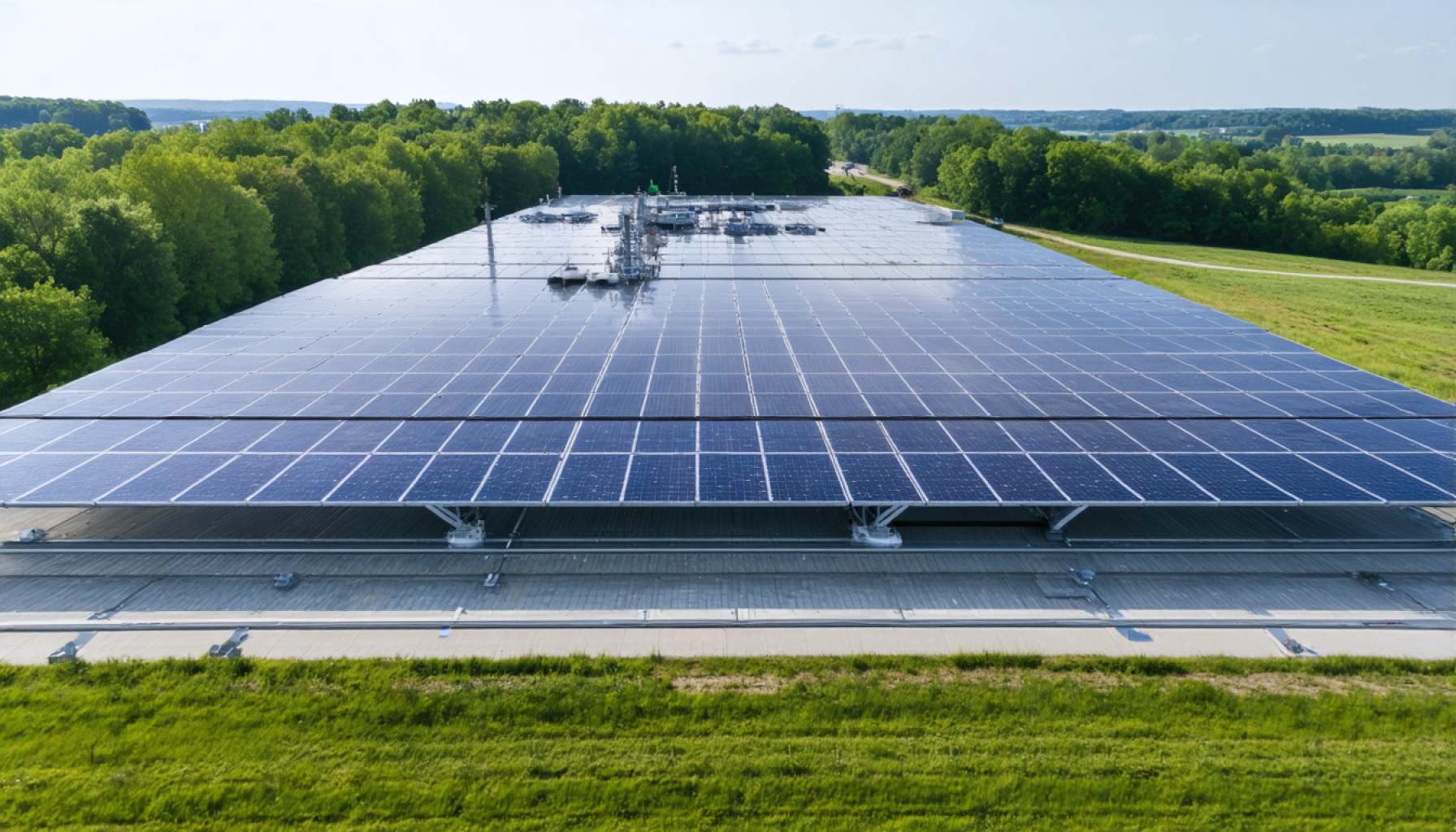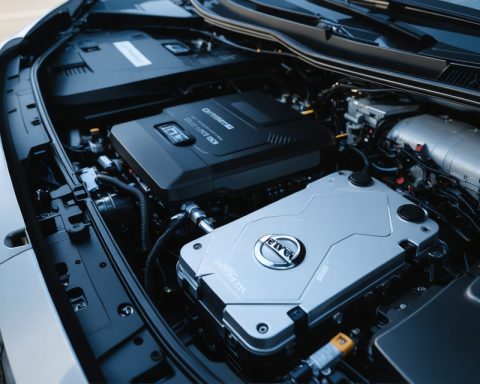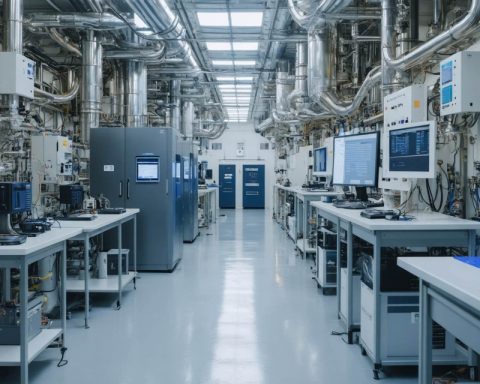- LG Energy Solution (LGES) has taken full ownership of the Ultium battery manufacturing facility in Lansing, Michigan, marking a significant shift in clean technology.
- The move is supported by over $2 billion in investments and ensures retention of at least 1,360 high-quality jobs in the area.
- Lansing’s facility is 98% complete and equipped with cutting-edge technologies for next-gen electric vehicle components.
- The strategic takeover underscores Michigan’s growing role as a hub for battery innovation and electric vehicle advancement.
- LGES’s commitment enhances Michigan’s legacy in the auto sector, promoting sustainable community growth and energy independence.
- This venture positions Lansing as a focal point for innovation and plays a critical role in the future of renewable energy technology.
Beneath the towering spires of Michigan’s capital city, a new era in clean technology ignites. With a swift stroke of corporate restructuring, LG Energy Solution (LGES) has taken the wheel, assuming full ownership of the state-of-the-art Ultium battery manufacturing facility in Lansing. This strategic move, approved by the Michigan Strategic Fund Board, marks a pivotal moment in the state’s journey toward becoming a hub for battery innovation and electric vehicle advancement.
Imagine a sprawling facility, where nearly every detail is meticulously crafted for the future, with construction currently 98% complete. Once part of a notable joint venture with General Motors, the plant now finds itself entirely in the capable hands of LGES—armed with a fresh vision and ambitious goals that reaffirm Michigan’s industrial prowess. Embodying the very heart of America’s auto belt, Michigan’s vibrant workforce stands ready to spearhead this transformation, ensuring that the pulse of progress beats with vigor.
LGES’s absorption of the project doesn’t merely signify a strategic takeover; it is a robust commitment to build upon Michigan’s rich legacy in the auto sector. This pivot is underpinned by more than $2 billion in investments, streaming vitality into the project. The company guarantees that at least 1,360 high-quality jobs will remain in Lansing—an investment in both people and place that forms a bedrock for sustainable community growth.
Through this venture, LGES is not just reiterating its confidence in Lansing but also setting the stage for the city to shine as a beacon of innovation. It is a promise to propel the area into the fast lane of the electric revolution, ensuring that Michigan remains at the forefront of battery manufacturing and technology development. This isn’t just about making batteries; it’s about shaping the entire narrative of energy production within the region.
Within the walls of this nearly completed plant, cutting-edge technologies and advanced production lines are poised to churn out pivotal components needed for next-gen electric vehicles. The plant stands as a testimony to modern engineering and forward-thinking initiatives, representing a leap toward the green horizons of the future. LGES’s arrival as the sole captain of this enterprise seamlessly aligns with their pioneering vision in the battery sector, extending Michigan’s rich tradition of automotive leadership into the global electric vehicle movement.
By fortifying its investment here, LGES not only vows to uphold its workforce commitments but also solidifies Lansing’s reputation as a cornerstone of battery innovation. This transition underpins an ideology that resonates across the strategic echelons of the energy sector: energy independence begins at home, in the steadfast heartland of America.
As the facility nears the final stages of completion, Lansing is poised to emerge as a nerve center of innovation, propelling Michigan’s economy and contributing to the burgeoning narrative of renewable energy technology. The ripple effects of this venture will echo for decades, casting Michigan as a forerunner in the electrification race—one charged battery at a time.
Welcome to the future of power, where Michigan isn’t just keeping pace; it’s setting the bar.
The New Powerhouse in Battery Innovation: Michigan’s Ultium Facility Paves the Way
Overview of LG Energy Solution’s Strategic Move
LG Energy Solution’s (LGES) full acquisition of the Ultium battery manufacturing facility in Lansing is a game-changing milestone for Michigan’s clean technology landscape. This strategic shift positions Lansing as a key player in the global battery and electric vehicle (EV) markets. With this move, LGES is capitalizing on Michigan’s automotive legacy and spearheading advancements in sustainable energy production.
1. Cutting-Edge Technology in the Ultium Facility
The facility, nearing completion, is outfitted with state-of-the-art production lines designed for large-scale battery manufacturing. This modern plant aims to cater to the growing demand for high-performance batteries, crucial for the next generation of electric vehicles.
– Advanced Manufacturing: Incorporating automation and robotics, the facility ensures efficient and defect-free production.
– Sustainability Initiatives: Emphasis on eco-friendly practices, aiming for minimal waste and reduced carbon footprint.
2. Economic Impact and Job Creation
With an investment exceeding $2 billion, LGES is reinforcing its commitment to Michigan by ensuring the creation of high-quality jobs. The substantial investment includes:
– 1,360 Jobs: Providing stability and growth opportunities for the local workforce.
– Local Economic Boost: Contributing to local business ecosystems, from supply chains to service providers.
Real-World Use Cases and Industry Trends
Electric Vehicles (EVs) and Battery Manufacturing
– Market Forecast: The global EV market is projected to grow exponentially in the coming years, with battery demand expected to quadruple by 2030.
– Trend Shifts: Automakers increasingly focus on longer-range batteries and faster charging technologies, creating new opportunities for innovation at facilities like Ultium.
3. Insights & Predictions
LGES’s initiatives are poised to have far-reaching impacts:
– Energy Independence: By harnessing local resources and talent, Michigan strengthens its role in the U.S. energy landscape, promoting energy independence.
– Sustainable Innovation: As global focus shifts toward green energy, facilities like Ultium will play a pivotal role in transitioning to a low-carbon economy.
4. Controversies & Limitations
Environmental Concerns
– Resource Usage: Battery production is resource-intensive, and sustainable sourcing of materials remains a challenge.
– Recycling: The need for effective battery recycling solutions is crucial to managing long-term environmental impacts.
5. Recommendations for Staying Ahead
– Invest in Skill Development: Emphasize ongoing training for the automotive workforce to keep pace with technological advances.
– Foster Collaborations: Encourage partnerships between tech companies, research institutions, and governments to boost innovation and solve industry challenges.
In conclusion, LGES’s acquisition of the battery facility is not merely a business transaction; it’s a forward-looking strategy aiming to redefine power production and vehicle electrification. For those interested in exploring opportunities in the clean tech space, Michigan stands as an exciting and promising frontier.
For more insights into advancements in renewable energy and automotive technology, visit LG Energy Solution.
—
Quick Tips
– Monitor Industry Trends: Stay updated with market forecasts and emerging technologies in EV and battery sectors.
– Prioritize Sustainability: Support companies and products that emphasize eco-friendly practices.
– Continuous Learning: Engage in professional development to navigate evolving industries such as battery manufacturing.















